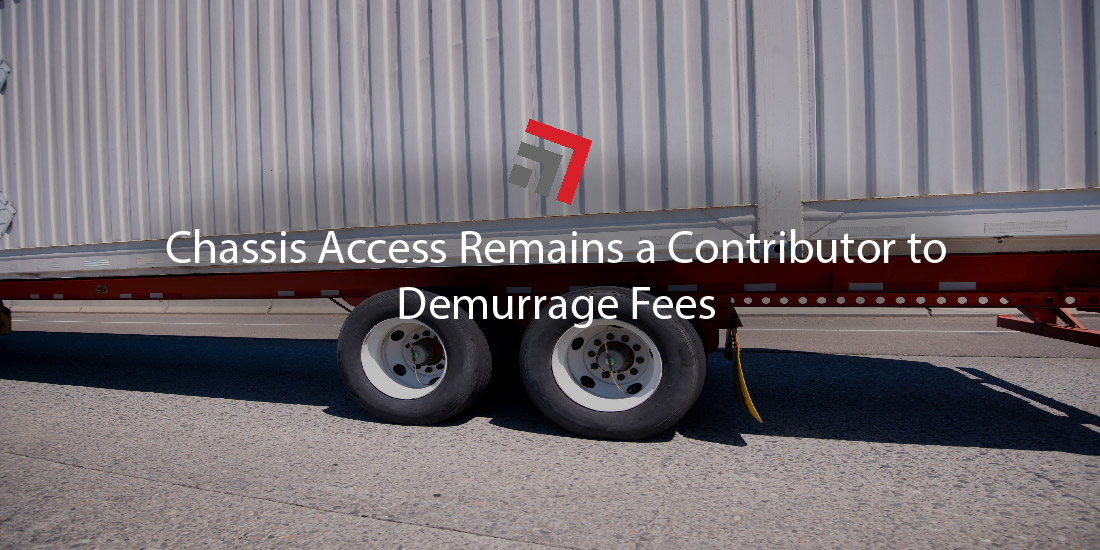The floodwaters of COVID-era circumstances have mostly receded on the shores of supply chains. However, despite market conditions at a lower tide, waves will crash in from time to time. A reminder that the last two years wasn’t a blip of blunders that the industry has now waded past, but rather a preamble to post-pandemic logistics.
Demurrage lingers as a post-pandemic issue
An issue that’s been front and center is demurrage.
Demurrage is a fee attached to cargo that has overstayed its welcome at a terminal or yard. The added charges are enforced by whoever manages the space that the lingering freight sits at. Whether that’s warehouses, terminals, or other vendors, fees and policies can change from place to place.
While demurrage existed before COVID-19, it was extrapolated during the pandemic’s volatile impacts on the market. It became a lot more common, and less avoidable, for cargo owners to incur costs and suffer penalties at inland rail ramps.
And even though inland hubs are less congested, demurrage fees have carried over into the post-pandemic climate—much to the chagrin of shippers and everyone else involved.
Chassis access is to blame
The biggest bottleneck that has contributed to demurrage fees sticking is chassis access.
Chassis, semi-trailers designed to carry containers, are oft-overlooked components to intermodal and inland point shipping. However, without this valuable equipment, a container is effectively paralyzed and can’t be loaded onto a truck.
With chassis production steadily rebounding the past several months, it was easy to assume the bottleneck behind demurrage fees was solved.
While that’s true to a degree, an equipment shortage has never been the only issue.
It’s uncommon for carriers or asset-owning forwarders to have their own chassis. Instead, it’s typical for them to partner with private chassis providers, like DCLI or TRAC Intermodal.
And, provide chassis they do…but, on their own clock. Apart from the railroads or trucking companies, chassis providers are often closed on the weekends, like most private businesses.
Ta-da. There’s the other bottleneck. The one that continues to haunt intermodal logistics in the post-pandemic.
Let’s say Union Pacific, a Class I railroad, makes a Hapag-Lloyd container available in Seattle on Friday afternoon, then a shipper could be looking at demurrage fees because the railroad is open Saturday and Sunday while Hapag-Lloyd’s chassis partner is likely closed for the weekend.
Railroads will usually provide free time for the same day they notify the involved parties, plus an additional 24 hours, however in this scenario fees would be imposed on Sunday if the available container had not been picked up yet.
Trucking wants weekend chassis availability
As a result, this has greatly peeved trucking companies, the initial recipients of any demurrage disaster. Inevitably, the incurred fees also pass expense onto their shipper customers, the likes of whom are already well-conditioned for invoice surprises.
After coping with a cabinet’s worth of Advil from COVID-era demurrage headaches, trucking companies are no longer biting their tongues and are now pushing for railroads and chassis providers to sync their hours on weekends.
During the pandemic, it was futile for trucking to pressure the two sides to coordinate schedules since chassis pools were already depleted to begin with and delays were inevitable regardless of timing.
However, since chassis supply is recovering, trucking finds itself on better footing to strike these conversations with the railroads and equipment providers.
While the market is soft right now, there are indicators that it’ll pick up in the second half of 2023. If these discussions are to happen, expect trucking to apply pressure sooner than later in a bid to avoid this issue worsening from a potential freight surge.
Seven-day chassis rental is not a simple change
Of course, nothing’s ever a simple switchover. Chassis providers assert that weekend hours come with certain complexities to their business model.
The first issue is the minimal freight activity on the weekends based off gate traffic in marine and rail terminals falling considerably on Saturdays and Sundays. Clearly, equipment providers fear they’ll lose money.
It’s not unreasonable that chassis providers would then raise their rental charges on weekends to placate any potential deficits.
How much would this cost trucking companies? Would a premium on weekend leasing incur as much cost as a day of demurrage penalties?
It’s not a question anyone can definitely answer right now. However, the urgent point is, weekend operations are not a simple plugin chassis providers can simply accommodate.
It has to make sense for their bottom line to correspond. Or, maybe trucking will just ask regulatory demigods to get involved.
Final Thoughts
Jokes aside, government intervention could prove tricky as stakeholders, even those in trucking, are weary of having a federal mandate imposed for weekend hours.
Chassis providers are privately-owned companies. If any regulation is implemented, the following question will be inevitably waged: “Do railroads and trucking companies, both privately-owned, have a say in determining the hours of privately-owned chassis providers?”
What precedent does this set for future regulation? While rail and trucking may enjoy extended hours for chassis leasing, what happens if the next object of federal intrigue is one of their own industries?
Please contact us if you have any questions regarding this topic or any others in domestic logistics. In addition, stay up to date with weekly headlines from both trucking and rail via our Road Map newsletter.
More blogs similar to this:



Recent Comments